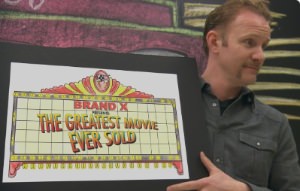‘The Greatest Movie Ever Sold’
In his new film about the further commercialization of movies, Morgan Spurlock looks to grind his ax against the practice of product placement.A movie about product placement, brought to you by POM Wonderful pomegranate juice.
To be bluntly honest, I don’t care much for Morgan Spurlock. I find his strenuous efforts to charm us to be utterly charmless. He’s essentially an All-American wiseguy with a propensity for making pseudo-documentaries about preposterous subjects. He’s like that annoying guy in the back of the class, bound almost fatalistically to inherit his dad’s used-car dealership.
We first noticed him, of course, in “Super Size Me,” in which he undertook to eat nothing but McDonald’s food for 30 days, with predictably bad effects on his health. No one seemed to notice that you could achieve the same thing if you ate nothing, say, but pheasant under glass for a similar period. Spurlock is now back with a film about product placement in the movies called “Pom Wonderful Presents: The Greatest Movie Ever Sold.” It traces his efforts to finance a film by selling the rights to display all kinds of commercial objects in a movie that consists largely of Spurlock visiting a variety of corporate offices, where he urges the makers of everything from shoes to shampoo to buy into his scheme. His biggest success, obviously, was with the makers of Pom—a particularly awful-tasting pomegranate juice (I know that because bottles of the stuff were passed out at the screening I attended), which paid him something like million bucks for naming rights to his film.
Mostly Spurlock is working the fringes of American capitalism and he ultimately achieves success because he’s pitching to his own kind—men and women who have carved out their commercial niches with harmless products of dubious value. Often enough they reject Spurlock. But enough of them recognize him as one of their own — a pitchman riding along on a smile and a shoeshine, cheekily hawking an opportunity to participate in a nonevent that, all kidding aside, cannot provably help or hinder their own enterprises.
Product placement works like this: Let’s say you’ve got a car chase in your movie. You obviously need automobiles to race around (and get wrecked). You can go out and rent the vehicles. Or you can get a manufacturer to contribute them to the movie, getting to use them free or, at the very least, paying a fee for the privilege. The paying public knows nothing of such arrangements. To them, a car is just a car. It follows from this indifference—or so it seems to me—that they are not going to run right out and buy said vehicles based on these on-screen glimpses of them in action. It is possible, I think, that if their drivers are seen sucking down a bottle of Pom after their exertions, that might plant a “let’s try it” thought in a few minds, but that strikes me as largely harmless as well. A huge range of other marketing ploys doubtless contribute to our decision to take a non-fatal taste of the unforbidden fruit.
We are here in the realm of “no harm, no foul.” And if product placement contributes its mite to making the bottom line of a movie marginally more agreeable, so be it. Indeed, I think it sometimes makes a film more realistic. I find that films in which imaginary brands of cigarettes or what have you are displayed have a tendency to throw you out of whatever reality they are trying to establish. “Hmm, ‘Nerny-Perns,’ ” you say to yourself. “Never heard of those. Wonder what else in this movie is fake?”
It’s true, as “Greatest Movie” makes clear, that filmmakers cede a certain, minor amount of control over content to the makers of the objects seen in their movies. Obviously, you don’t want your precious product to be perceived negatively by viewers. But since we take in the presence of a product in a scene almost subliminally, that doesn’t strike me as much of a problem either.
If Spurlock’s film has any value, it is as portrait of self-deception, a point it does not overtly make. It’s all snake-oil-salesman to snake-oil-salesman — lots of people earnestly considering whether spending a decent amount of cash on an activity will have any effect whatsoever on the Dear Sales Curve.
So it all comes down to how they respond to Spurlock, the super-sized salesman. Do they recognize him as a wayward, cheeky brother in dubious commercial battle, trying to charm the wallet out of their pants? Or do they see him as just another con man to be chortled over at the end of an otherwise dreary day at the office? Me, I wouldn’t give him a dime. But my “product” — the words you’re reading — has already been “placed” on this website. There’s nothing you can do about it but scroll down.
I’ve never thought about it this way before, but maybe we are among the last bastions of uncompromised free enterprise — here’s what I have to offer; take it or leave it. Let’s celebrate that increasingly rare condition over … what? … a bottle of Pom, perhaps?
Your support matters…Independent journalism is under threat and overshadowed by heavily funded mainstream media.
You can help level the playing field. Become a member.
Your tax-deductible contribution keeps us digging beneath the headlines to give you thought-provoking, investigative reporting and analysis that unearths what's really happening- without compromise.
Give today to support our courageous, independent journalists.






You need to be a supporter to comment.
There are currently no responses to this article.
Be the first to respond.